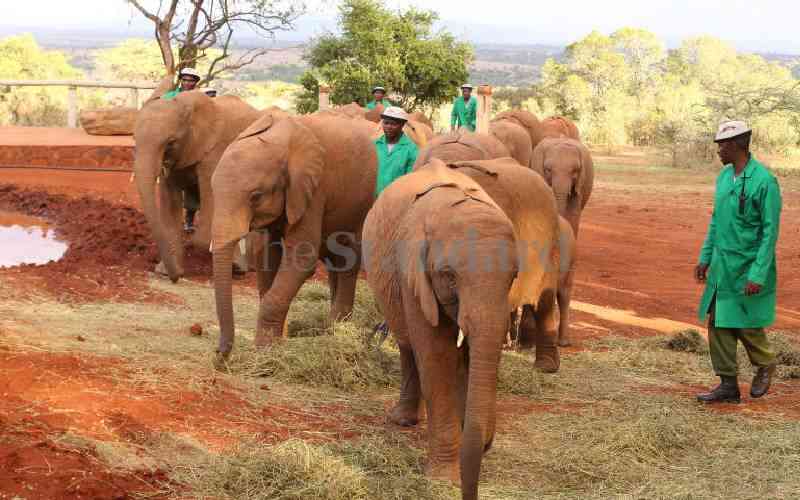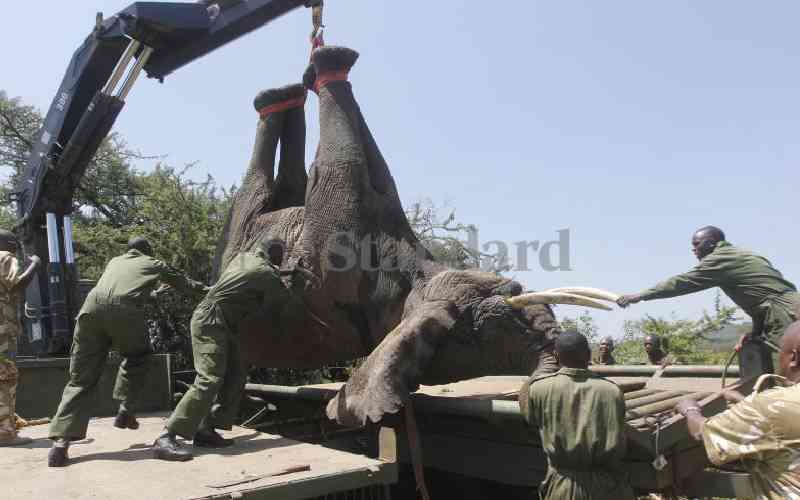 |
|
A carcass from a previous drought, the government says it won’t allow a repeat of such deaths. [PHOTO: STANDARD] |
NAIVASHA, KENYA: The government has announced plans to supply fodder and water to wildlife in various national parks following adverse weather conditions that has hit parts of the country.
The exercise that will be carried out by KWS is meant to save hundreds of wild animals that are facing starvation due to the failed long rains in April.
The Principal Secretary in the Minister of Environment Dr Richard Lesiyampe said that parks and ranches in North Eastern were the most affected.
He termed the situation as serious adding that pastoralists were also affected by the harsh weather conditions though the government had embarked on buying their livestock.
“Five years ago we had a similar problem where we ended up providing fodder and water for the wild animals and if the situation prevails we shall be forced to do the same,” he said.
The PS was addressing the press after opening a two day workshop on sustainable land management held at Great Rift Valley Lodge in Naivasha.
He admitted that the country was already feeling the effects of climate change pointing to the failed rains as some of the effects.
“The government has put in place mitigations measures and there is a bill already in parliament and a policy on climate change,” he said.
Lesiyampe identified challenges of environmental degradation as loss of biodiversity, reduction in productivity, increased environmental pollution and changing weather patterns.
The PS at the same time announced plans to rehabilitate two rivers in Uasin Ngishu and Migori counties as one way of protecting urban rivers.
“We are working with county governments to rehabilitate these urban rivers as we did with Nairobi River,” said the PS.
He revisited the issue of blocked corridors around Lake Naivasha saying that this had led to an increase in cases of human-wildlife conflict.
“We are concerned by the encroachment of corridors and riparian land around the lake as this has led to an increase in cases of human-wildlife conflict,” he said.
On her part, the national manager for sustainable land management project Dr Zainab Khalif expressed her concern over increased cases of deforestation.
Khalif said that this had contributed to climate change adding that there was water and soil pollution due to poor plastic disposal.
Stay informed. Subscribe to our newsletter
“Some of the challenges facing sustainable land management include conflicting policies, land tenure and poverty which has led to increased deforestation,” he said.
 The Standard Group Plc is a
multi-media organization with investments in media platforms spanning newspaper
print operations, television, radio broadcasting, digital and online services. The
Standard Group is recognized as a leading multi-media house in Kenya with a key
influence in matters of national and international interest.
The Standard Group Plc is a
multi-media organization with investments in media platforms spanning newspaper
print operations, television, radio broadcasting, digital and online services. The
Standard Group is recognized as a leading multi-media house in Kenya with a key
influence in matters of national and international interest.
 The Standard Group Plc is a
multi-media organization with investments in media platforms spanning newspaper
print operations, television, radio broadcasting, digital and online services. The
Standard Group is recognized as a leading multi-media house in Kenya with a key
influence in matters of national and international interest.
The Standard Group Plc is a
multi-media organization with investments in media platforms spanning newspaper
print operations, television, radio broadcasting, digital and online services. The
Standard Group is recognized as a leading multi-media house in Kenya with a key
influence in matters of national and international interest.










